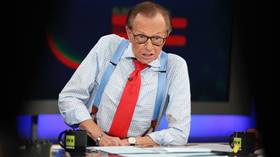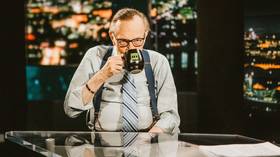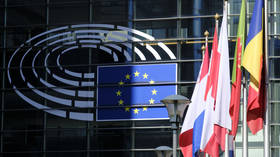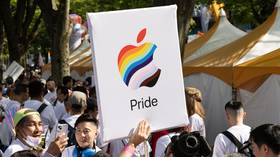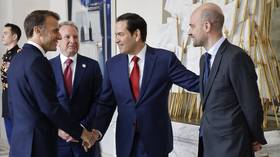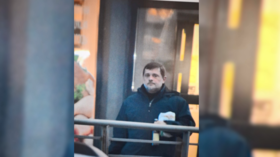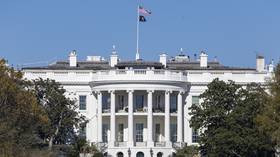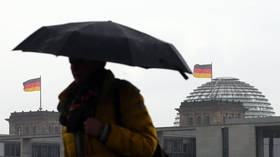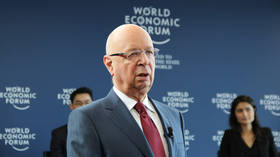How Larry King and the FBI teamed up to catch a crazed caller
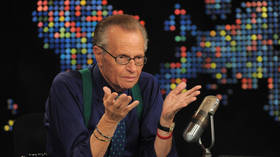
In the early afternoon of January 14, 1988, Larry King was enjoying lunch at the Duke Zeibert’s restaurant in Washington, DC, famed hangout for everyone from presidents to prized quarterbacks. Across town at CNN’s DC building, where ‘Larry King Live’ was sometimes beamed out to millions of viewers, a producer had just received warning of an emergency at the host’s Arlington, Virginia residence. He was to call home immediately.
The message forwarded by his secretary was stark: “Tell Mr. King he better get in touch with me because he’s interfering with someone in my life."
“I am not going to leave my name, Mr. King better get in touch with me before 2:00 or else something serious is going to happen to him.”
The spooked secretary later recounted that an unknown male had made the call and sounded “upset and irritated.” He left a return number, and likely made two further hang-up calls to the celebrity’s answering service. Clock ticking, back at Zeibert’s King wasn’t leaving anything to chance. He quickly dialled the number before time ran out.
“Hello, this is Larry King and I’m returning your call.”
Whether panicked for answers or assertive under pressure, he told the blackmailer to “speak up” over the background bustle of the restaurant. The voice on the other end demanded to know if King was acquainted with a particular woman. Larry confirmed that he was. The man then became neurotic and accused him of a love tryst with her:
“You are seeing her tonight, I know you are seeing her tonight. You are having dinner with her tonight.”
The threat was clearly spelled out, with a further condition. If any such rendezvous took place, there would be trouble.
FBI Enter Stage Right
These disquieting conversations are outlined in FBI documents on King recently obtained by the Black Vault, and analyzed by RT investigative unit The Detail. While some files were apparently destroyed and others are missing, the remaining papers lay out the extortion threat and the Bureau’s response in grave detail.
Initial inquiries were carried out over two days by the Alexandria, Virginia division of the FBI and promptly forwarded to offices in DC and Los Angeles. The broadcaster was soon to travel to LA to record his radio show and attend the ACE Awards while in the company of an unnamed individual. Underlining the seriousness of the situation, memos on the threat even reached the desk of William S. Sessions, Bureau director.
On January 14, mere hours after the threatening exchange, FBI operatives arrived at King’s residence in Arlington, Virginia. The condo complex on Nash Street was serviced by a manager who timestamped the initial call at 1:10pm. Regarding the mysterious lady in question, the media star denied having plans with her, but he was off out that evening and vowed not to answer his phone or use his secretarial service.
The following day the FBI returned, and King consented for trap and trace and recording equipment to be installed on his phone. The files record he also authorised the agents to use any equipment “the FBI felt necessary and deemed appropriate to utilise.” The Assistant United States Attorney (AUSA) from the Eastern District of Virginia, who was overseeing the case, suggested to King that he telephone the unhinged caller in a sting operation.
They saw “no problem with entrapment and only requested that King be advised not to be intimidating or aggravating.”
Larry was going undercover.
Flashback, December 1964
The files show that King had contact with the Bureau as early as December 1964, when he called long-distance from radio station WIOD, Miami, asking whether notorious founding FBI Director J. Edgar Hoover wanted to join then-President Lyndon B. Johnson and Vice President-elect Hubert Humphrey in sending congratulatory telegrams to the re-elected state attorney for Dade County, Florida, Richard E. Gerstein.
King was involved in a luncheon for Gerstein with some 1,000 guests at the Dupont Plaza Hotel in Miami. Hoover said no.
While Gerstein had been “generally cooperative with the Miami office,” the FBI believed he’d buddied up with “hoodlum elements in both Florida and Havana,” so there would be no back-patting. It seems the FBI and president have not always been on the same page.
It wasn’t just America’s domestic spying agency that had a keen interest in Larry King, either. Declassified documents from the CIA detail how it closely monitored the content of his various shows via its Public Affairs division, particularly towards the end of the Cold War.
Any intelligence or national security figure that King interviewed, or any high-profile geopolitical subject matter explored, was at least the subject of a transcript or memo – including guests such as former CIA Directors Admiral Stansfield Turner and William Colby, and journalists Jack Anderson, Claire Sterling, and Vladimir Pozner.
King’s relationship was close enough to attend another elite luncheon at The Palm with then-Director of Central Intelligence William J. Casey, on February 10 1986. The heavily redacted diary for the director puts them alongside lawyer and former Treasurer of the DNC Edward Bennett Williams, and the self-styled ‘world’s best negotiator’, Herb Cohen – all organized by the director of enforcement for the Securities and Exchange Commission, Stan Sporkin.
Flash forward, January 15 1988
In his second interview with the FBI, King told the attendant G-men he didn’t know the caller, but he admitted that he met the “very nice” woman two years prior at one of his broadcasts and still had what he believed to be her phone number. He described her as only a “casual acquaintance.”
He did, however, receive a curious letter from her the morning of the threat, wishing him well after recent heart surgery. At approximately 10.30am, equipment ready and being supervised by agents of the Alexandria FBI, Larry King began phoning the suspect on a Californian line.
After some failed attempts attributed to the West Coast time difference, he got the suspect talking and the sad truth came flooding out. This wasn’t a well-planned scheme for money, the man hadn’t put out some kind of revenge hit, and there was nothing to suggest that he and the woman were in cahoots as part of an elaborate conspiracy.
The caller, whose name remains redacted, shamefully conceded he was just a mere “crackpot, not a violent individual” and he’d never harm anyone.
The file describes how he was “distraught over his failed relationship,” and thought his love had left him for the face of CNN. He was “drunk and angry” when he left the message and now “realized that he did many things he should not have done.”
Not much from King’s side of the conversation is disclosed, but the broken bumbler had no chance against the legendary interviewing skills of both a decades-long broadcaster and the FBI.
With that, the AUSA advised that the man hadn’t committed a federal violation, and it was decided that the FBI in Irvine, California, would pursue a closing interview to “strongly admonish his actions.”
In a transcript dated January 18 1988, a pair of special agents attempted this, though things didn’t quite go to plan. Indignant at the intrusion, the recalcitrant caller said he needn’t answer to the FBI and ordered them to leave. The agents obliged and no further action was taken.
As far as Larry King’s accused lover, she was eventually traced to another address in California and described the man who had made the calls as a harmless alcoholic. The short memo also says she was indeed familiar with the talk show host, but the agent did not press for details on the nature of their relationship.
King, who was divorced from his fifth wife when the incident took place, continued to be one of the most respected hosts on US television. His staple CNN show went on until 2010, with an unrivalled variety of high-profile guests, ranging from Bill Gates and duelling politicians to Russian President Vladimir Putin in 2000.
He passed away January 23, 2021, aged 87, from sepsis, while still hospitalized with complications from Covid-19.
In the age of Twitter spats and online stalkers, it’s hard to remember a time when celebrities faced their haters via such a personal medium as a phone call. However, the tale from Larry King’s FBI files is a cautionary one.
If you’re going to get drunk and babble jealously at someone’s suspected new lover, make sure they’re not such a prominent figure – especially not a prominent figure that has the full-frontal force of the FBI on his side.
